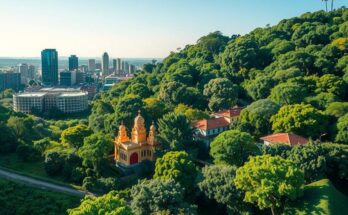In Turkey’s Kurdish heartland, increasing distrust hampers the peace process following Abdullah Ocalan’s call for disbandment of the PKK. The pro-Kurdish DEM party seeks reforms to bolster democratization, yet frustration over government transparency reverberates among Kurds. Ongoing military actions and political repression contribute to a sense of instability, despite some indications of potential dialogue and reform.
In the Kurdish heartland of Turkey, a prevailing sense of distrust is undermining the prospects of a peace process intended to ameliorate a long-standing conflict with Kurdish militants. The government’s response to reforms following over 40 years of violence remains unclear, causing anxiety among Kurds about the potential for true reconciliation. This fragile situation has broad implications for Turkey’s political and economic stability, particularly in the less developed southeast region, where social unrest and economic challenges persist.
With the recent call from Abdullah Ocalan, jailed leader of the Kurdistan Workers Party (PKK), for his group to disband—with the aim of fostering peace—the pro-Kurdish Democratic Regions Party (DEM) has been pushing for meaningful democratization reforms. Despite the PKK’s declaration of a ceasefire, significant skepticism remains, particularly among local Kurds and politicians who express concerns over governmental transparency.
Protests have erupted following the surprising jailing of Istanbul Mayor Ekrem Imamoglu, indicative of broader political repression. Perspectives highlighted by DEM lawmaker Cengiz Candar encapsulate the trepidation felt by many: “We are entering a minefield. It could go off the rails and end in failure.” Meanwhile, DEM’s dialogues with Ocalan remain stifled, with the party feeling uninformed about any reform strategies.
Positive signs emerged during the recent Newroz festival, with a coincidental suggestion from President Erdogan to establish Newroz as a national holiday, an idea simultaneous to DEM’s proposal. However, the overarching sentiment in Kurdish regions remains one of deep-rooted mistrust towards the state, exacerbated by the historical context of state violence during similar celebrations.
The PKK’s operations in northern Iraq further complicate the peace dialogue. A PKK representative voiced their suspicions regarding Ankara’s motives, citing ongoing military actions that undermine trust in the state. Meanwhile, Turkish officials maintain that operations will continue as long as threats persist. Kurdish community leaders like Omer Iler highlight the struggles endured in the conflict, yet express frustration due to a lack of clarity regarding potential reforms post-ceasefire.
As expectations grow surrounding a new Turkish constitution that would incorporate various ethnic groups more broadly, voices within the government signal a willingness to engage with Kurdish identities. Despite this, many remain doubtful that such measures will adequately address years of grievances. Dueling narratives also play out as political actors, like former Prime Minister Binali Yildirim, hint at a shift in citizenship definitions, yet current ministers dismiss this as unnecessary.
Glimmers of optimism have emerged amid the challenges; for example, recent interactions between Erdogan and members of the DEM delegation reflect a possible thawing of relations. Nevertheless, the lingering complications of veteran political alliances and public perceptions of the peace negotiations reveal that patience and cautious optimism may be the order of the day in Turkey’s quest for a lasting solution.
The political landscape in Turkey’s Kurdish regions remains fraught with tension and skepticism regarding peace processes with the PKK. A lack of transparency and historical grievances hinder trust, even in light of potential reforms signaled by the Turkish government. While recent developments suggest some movement towards dialogue, doubts persist among Kurdish communities, necessitating careful navigation by all parties involved to foster genuine reconciliation and stability.
Original Source: www.marketscreener.com




